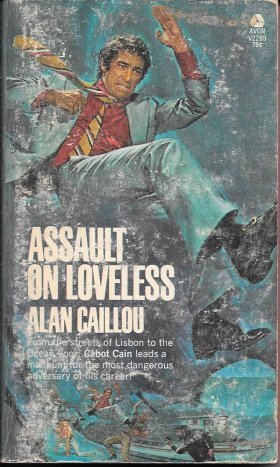He did so, and immediately fell forward. I let him fall to the ground, and he rolled over on his back and stared up at me in horror. A doctor letting a patient fall like that? And now he knew that there was something terrible going on and he couldn’t understand what it was. Couldn’t understand because of the drug, because for him lights were flashing, fear was sweeping over him, and unimaginable things were happening inside his brain, twisting it this way and that, showing him a clarity that wasn’t there at all and then brutally replacing it with a fantasy that was even worse.
In short, he was on a trip.
I said carefully, keeping up the lie: “I can save your life if I inject you within the next half hour or so. After that, I’m afraid it’s going to be too late.”
“Then...then...hurry, for God’s sake. Hurry, man.”
He rolled over onto his face and clutched at the bunk, dragging himself up onto it. Halfway there, he twisted his head and glared at me; he knew already.
He said thickly: “Not a doctor at all...you’re another...you’re a copper, aren’t you?”
I said: “It’s now nine-thirty. By ten o’clock you’ll be over the mark, past the time you can be saved. So, you’ve got half an hour to make up your mind and answer half an hour’s worth of questions, beginning right now. And if you don’t tell me what I want to know, I’m just going to walk out and leave you. So help me, I’ll leave you here to die.”
He had the strength, or the courage, to try and disbelieve me. He said, gasping: “Not only a cop, a crooked one...”
I said: “Loveless is dead, and we don’t know where he was hiding. That’s the first question.”
For a long, long time I did not think he was going to answer. He screwed up his eyes with an effort and stared at me. At last he said: “A deal? How can I know...know you’ll keep your end of it?”
I said: “Time’s short, isn’t it? It might really be less than half an hour, it’s hard to tell in these cases.”
He said: “You...you bastard! All right, the injection first.”
“The injection after.”
“A promise?”
He swayed out of control, and suddenly screamed; he clutched at his head and then began banging it against the wall furiously, trying to shatter it in obedience to some unseen and unexpected compulsion. I dragged him away and held him down on the bed, and waited till a moment of coherence came. He didn’t know which end was up, now, and all he could do was answer my questions, obey the disembodied voice that was sitting astride his chest.
The coherence was there again, though it was only momentary. He said, with a touch of grim humor: “So this is what it’s like...how long have I got?”
I said: “You won’t die, not yet, not if you keep talking.”
I wondered how strong his loyalty might be, wondered if it could control the uncertainty, or worse still, the incoherence.
He took a deep and painful breath. His eyes slowly crossed and uncrossed again, an extraordinary sight. He said:
“You’re all...all green and yellow.”
I could only imagine the startling colors that were affecting his vision. He reached out for something in the air and clutched at it, and there was nothing there at all.
I said again: “Where was Loveless hiding?”
He’d made up his mind, or the drug had made it up for him. He said, laboring: “Up by...by the castle.”
“São Jorge?”
“Yes, Rua...rua Vicente, number...eleven.”
“He sleeps there every night?”
“Yes...For God’s sake...Give me a shot...”
“Soon.” He was slipping away again, his body going limp. I shook him and said: “How much of the toxin does he have?”
“Four...four...four...” He was silent.
I shook him again, furiously: “How much?”
“Four...ounces.”
My God, at thirty thousand milligrams to the ounce, why in God’s name would he ever want to manufacture more of it?
I said: “Who was the man who was killed?”
“A chemist...a chemist from Madrid. His name...his name’s Serafino, Martinez...Serafino.”
Check. That was the name in the wallet they’d dragged up, soaked through with fermenting yogurt. Martinez Serafino, one of Spain’s leading psychopharmacologists, a brilliant man with a twisted mind and a chip on his shoulder, a man at war with half the world. I wondered how Loveless had come to find such a ready and valuable protagonist.
I said: “All right, four ounces of botulin. What’s it stored in?”
“I don’t...I don’t under...understand.”
I said impatiently: “In glass phials? Or what?”
“Four...four glass tubes in a steel box.”
“And where does he hide it?”

























